Construction Companies Reading
Top Construction Services in Reading
Receive multiple Construction Companies quotes for your project today! Compare profiles, reviews, accreditations, portfolio, etc... and choose the best deal.
- Ca
Calderon Demo & Excavating LLC
1Harrisburg, USAbout [Business Name] [Business Name] is a [Business Type] dedicated to providing [Brief description of services or products]. We are passionate about [What the business is passionate about] and strive to deliver exceptional [Services or products] to our valued customers. Our team is committed to [Business values or goals] and we are always looking for ways to improve our services and exceed expectations. We believe in [Business philosophy or approach] and are committed to building strong relationships with our clients. We are proud to serve the [Target audience or location] community and are dedicated to making a positive impact.
- Services
- Why Us?
- Gallery
Get Quote 
First Call Demolition LLC
4.737 reviews1114 Cantrell Street, Philadelphia, 19148, USAt First Call Demolition LLC, we specialize in full structural knockdowns, partial or select demolitions, and full interior demolitions. Our team, led by a husband-and-wife duo with over 12 years of experience in the demolition field, is dedicated to providing exceptional customer service and achieving 100% client satisfaction. We are fully licensed, bonded, insured, and registered with all city and state agencies. Our professional knowledge, attention to detail, and commitment to excellence set us apart from the competition. We are proud to serve Philadelphia and the surrounding areas, and we look forward to working with you on your next project.
- Services
- Why Us?
- Accreditations
- Our Team
- Gallery
Get Quote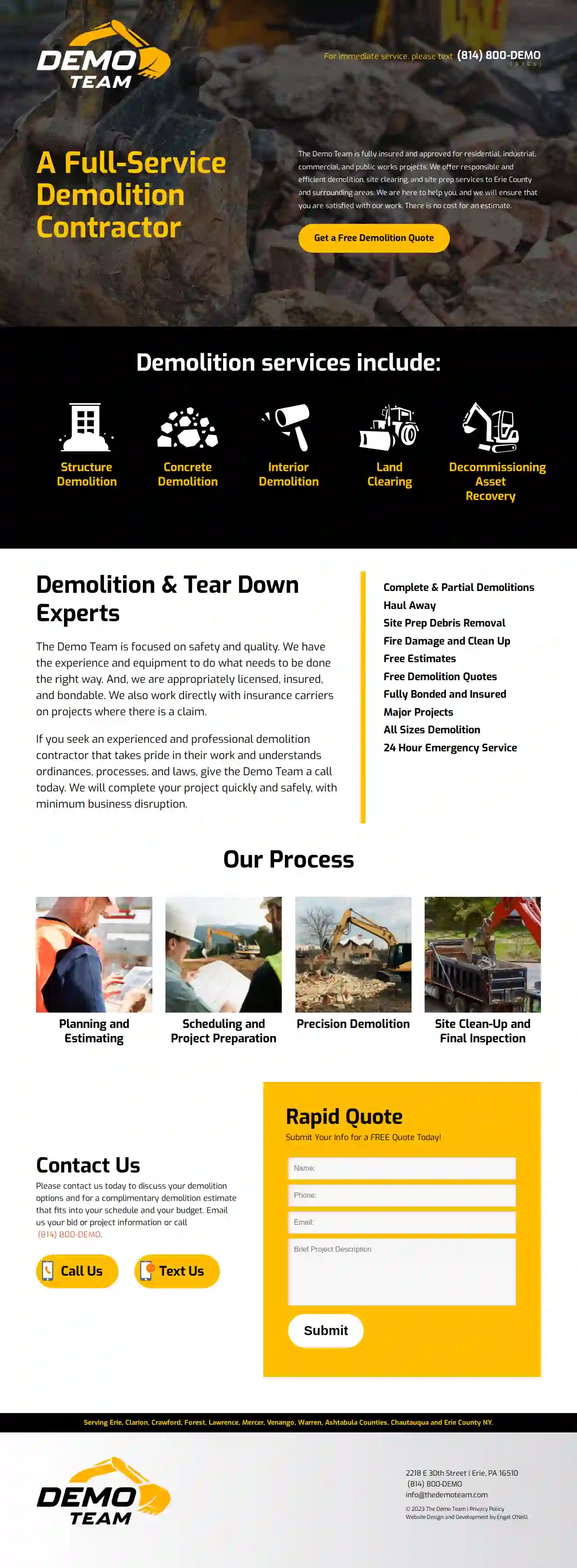
Demo Team
51 reviews2218 E 30th Street, Erie, 16510, USThe Demo Team is a full-service demolition contractor, fully insured and approved for residential, industrial, commercial, and public works projects. They offer responsible and efficient demolition, site clearing, and site prep services to Erie County and surrounding areas. The team is focused on safety and quality, with experience and equipment to complete projects the right way. They are appropriately licensed, insured, and bondable, working directly with insurance carriers on projects where there is a claim. The Demo Team provides complete and partial demolitions, haul away, site prep debris removal, fire damage and clean up, free estimates, and 24-hour emergency service. They serve Erie, Clarion, Crawford, Forest, Lawrence, Mercer, Venango, Warren, Ashtabula Counties, Chautauqua and Erie County NY.
- Services
- Why Us?
- Accreditations
- Our Team
- Testimonials
- Gallery
Get Quote
T.A. Industries
57 reviewsDouglassville, PA, 19518, USAt TA Industries, we're industry leading experts in excavation, demolition, and land clearing services. Our mission is to provide unparalleled site work to each of our clients, setting goals for each project individually to meet their needs. We're openly honest, proactive in communication, and intensely hardworking, exceeding expectations with great craftsmanship on every project. With a focus on medium-scale projects, we offer cost-effective solutions within an expedited schedule. Whether it's building up or breaking down, we look forward to working with you.
- Services
- Why Us?
- Our Team
- Gallery
Get Quote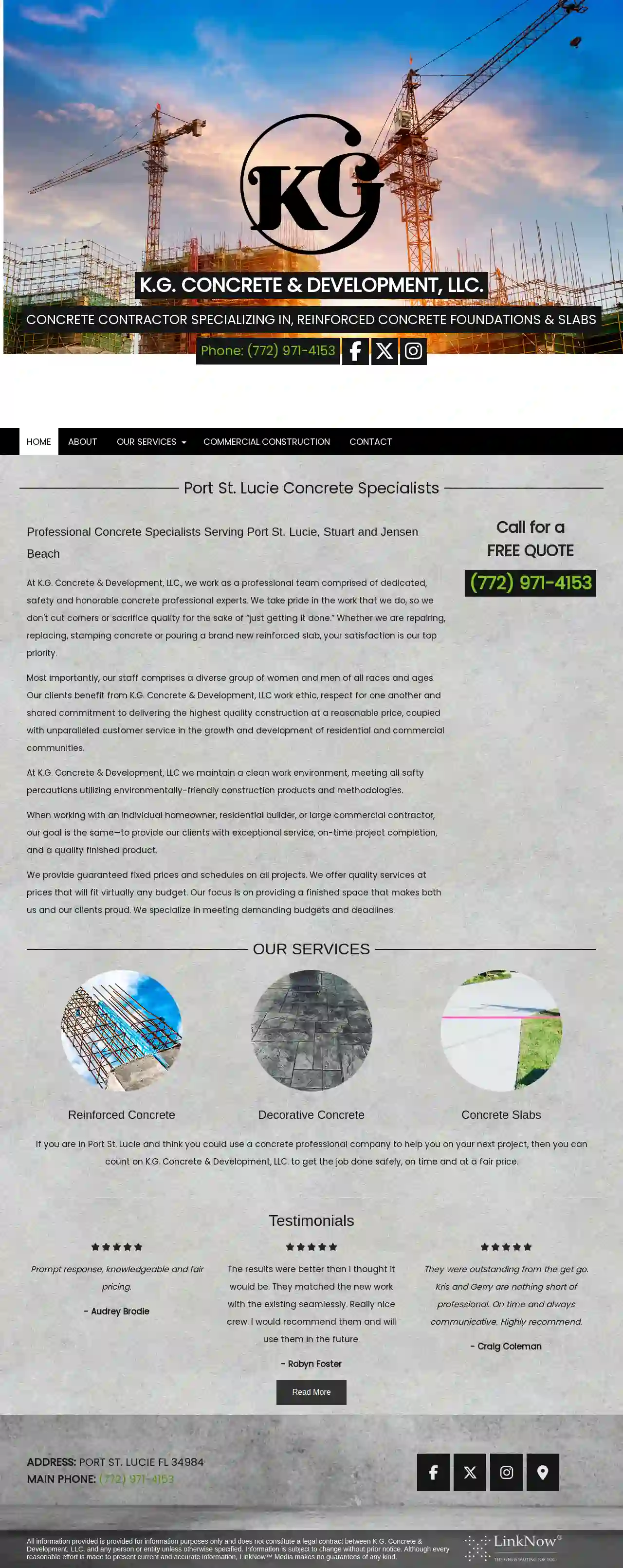
K.G. Concrete & Development, LLC.
51 reviewsPort St. Lucie FL, Port St. Lucie, 34984, USK.G. Concrete & Development, LLC. is a concrete contractor specializing in reinforced concrete foundations & slabs. We work as a professional team comprised of dedicated, safety and honorable concrete professionals. Our staff comprises a diverse group of women and men of all races and ages. We take pride in the work that we do, so we don't cut corners or sacrifice quality for the sake of “just getting it done.” Whether we are repairing, replacing, stamping concrete or pouring a brand new reinforced slab, your satisfaction is our top priority. We maintain a clean work environment, meeting all safety precautions utilizing environmentally-friendly construction products and methodologies. We provide guaranteed fixed prices and schedules on all projects. We offer quality services at prices that will fit virtually any budget. Our focus is on providing a finished space that makes both us and our clients proud.
- Services
- Why Us?
- Testimonials
- Gallery
Get Quote
CW & Sons Demolition and Property Cleanup
1Easton, Pennsylvania, USAt CW & Sons, we set the standard for property preservation and demolition services in Easton, PA. Dedicated to delivering exceptional waste material removal and junk hauling, we cater to residential and commercial clients throughout the Easton area. Our licensed and insured team ensures that every project is approached with the highest level of professionalism and integrity. Our mission is to deliver quality, professional services that make us the company of choice in our community. We specialize in a comprehensive range of services, including debris and rubbish removal, building material and yard waste removal, and post-construction hauling. For those looking to dispose of old appliances, mattresses, or furniture, our efficient disposal services ensure that your property is clutter-free in no time.
- Services
- Why Us?
- Gallery
Get Quote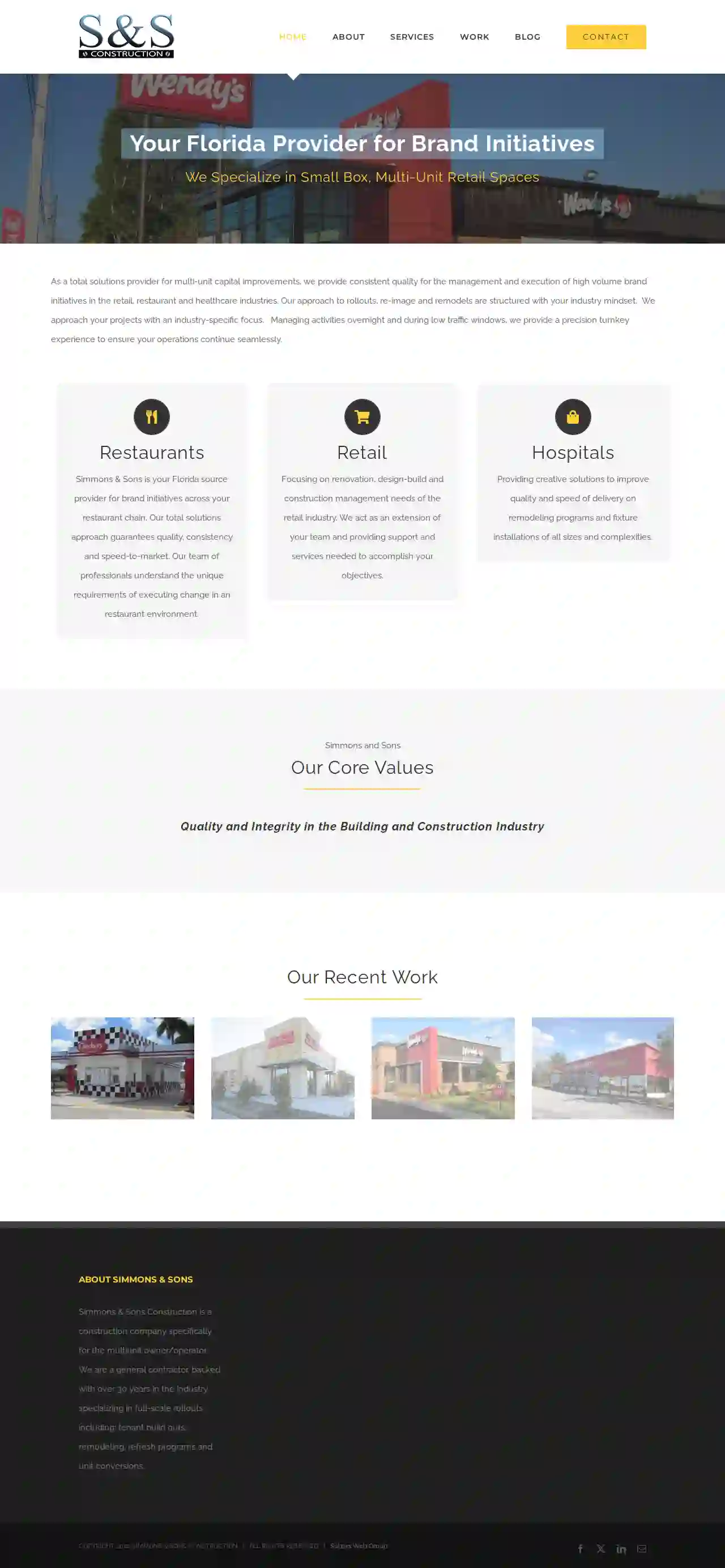
Simmons & Sons Construction
51 reviewsPalm City, Florida, 5027 SW Moore Street, 34990, USSimmons & Sons Construction is a construction company specifically for the multiunit owner/operator. We are a general contractor, backed with over 30 years in the industry, specializing in full-scale rollouts including: tenant build outs, remodeling, refresh programs and unit conversions.
- Services
- Why Us?
- Accreditations
- Our Team
- Testimonials
- Gallery
Get Quote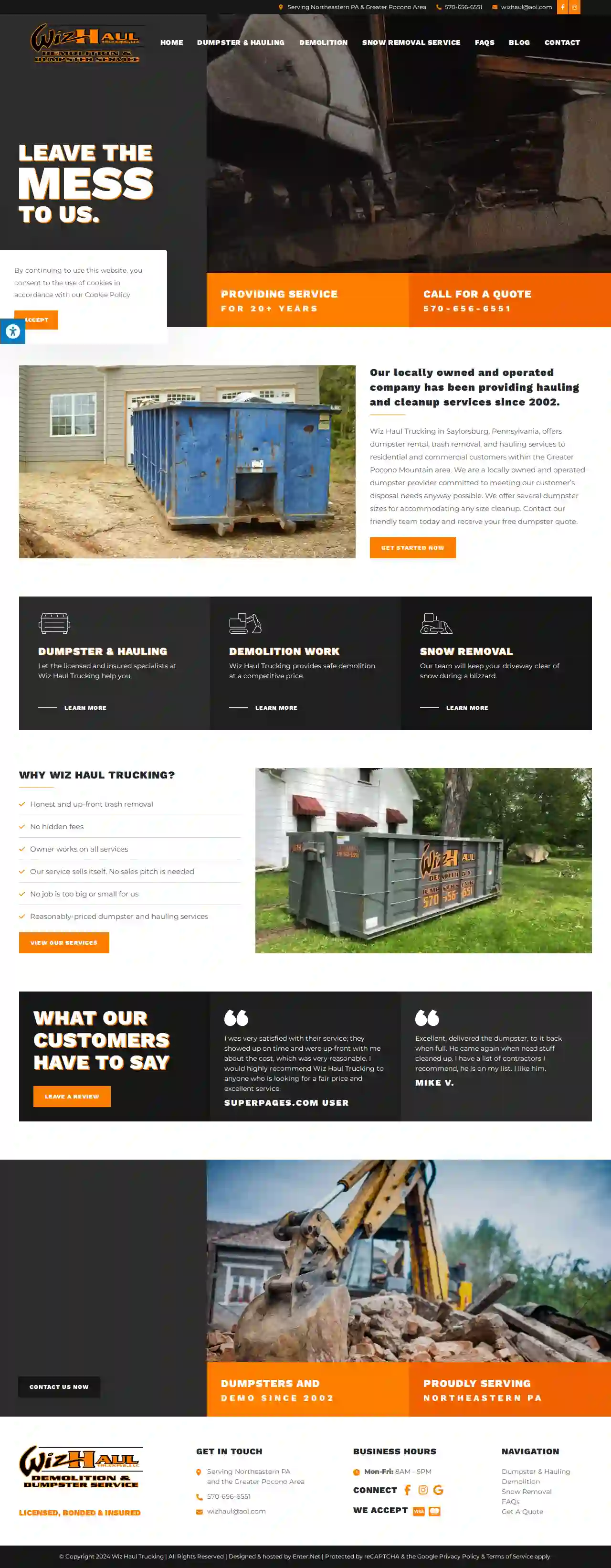
Wiz Haul Trucking
52 reviews2733 Oak Ln., Saylorsburg, 18353, USWiz Haul Trucking is a locally owned and operated company that has been providing hauling and cleanup services since 2002. We offer dumpster rental, trash removal, and hauling services to residential and commercial customers within the Greater Pocono Mountain area. Our team is licensed, bonded, and insured, and we pride ourselves on providing honest and up-front trash removal services with no hidden fees. We're committed to meeting our customer's disposal needs in any way possible, and we offer several dumpster sizes to accommodate any size cleanup. Contact us today to receive your free dumpster quote and let us take care of the mess for you.
- Services
- Why Us?
- Testimonials
- Gallery
Get Quote
Pro Concrete Contractors Allentown
1Allentown, USPro Concrete Contractors Allentown We are constantly on the go to perform any concrete service you require, no matter how simple or large-scale it may be. Whether in a home or business property, our skilled contractors can tackle the job with confidence and ease. When you entrust your dream project with us, we will make sure to provide you the best quality results you expect and more. Every service offering we deliver is backed with excellent customer care, which is the reason why we gain people’s trust and loyalty. We never settle for mediocre outcomes. Our goal is to bring you the highest form of craftsmanship in our work. Whatever type of concrete service you need for your home or business, we are the team that guarantees a successful result for a minimal cost. We can handle anything from basic installation to making concrete foundations to repairing existing concrete– we can do it all and more! You can depend on us to supply top-quality concrete service, no matter the scale of the job. We understand the right approach to install durable and stylish concrete that can last you a lifetime. We use top-grade materials and tools to finish the project on hand.
- Services
- Why Us?
- Gallery
Get Quote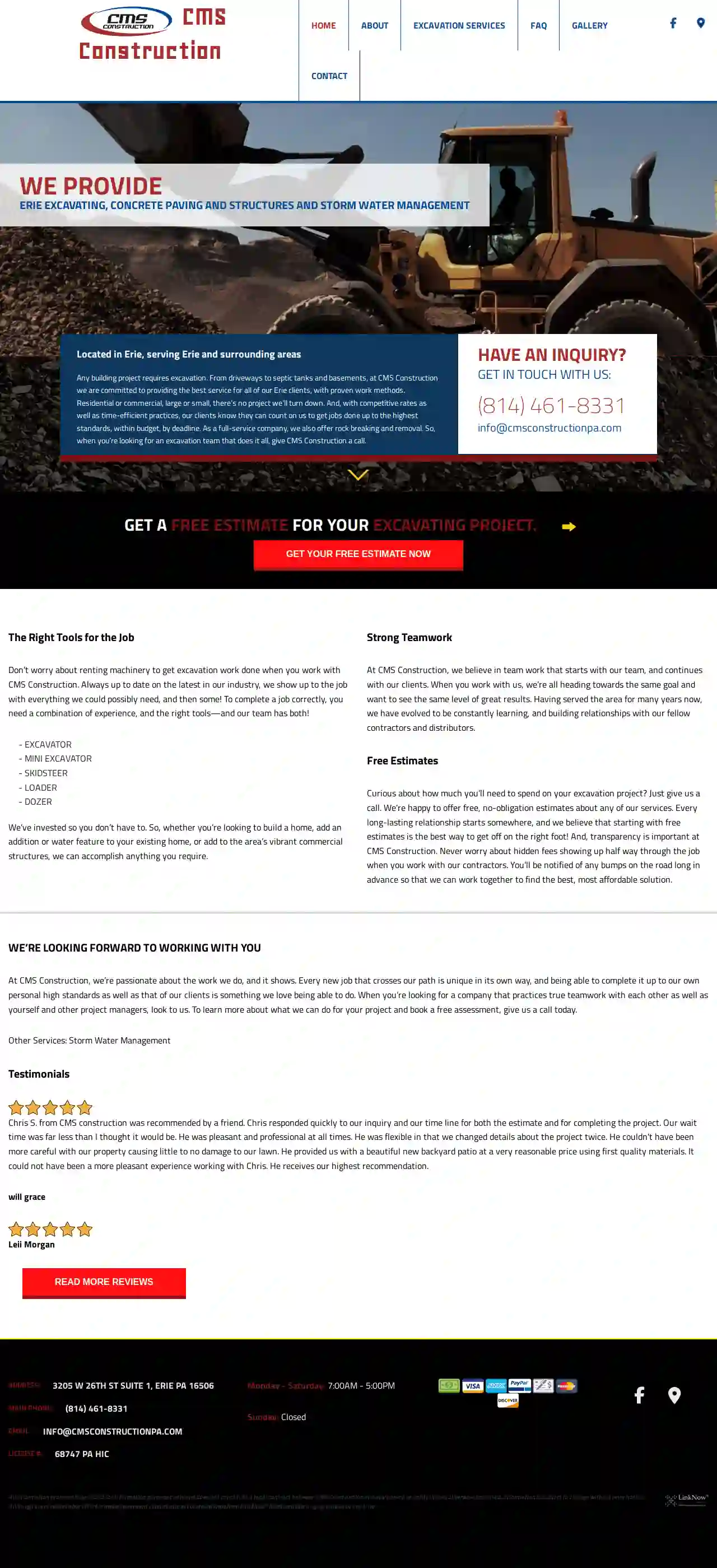
CMS Construction
45 reviews3205 W 26th St Suite 1, Erie, 16506, USCMS Construction: Your Trusted Excavation Partner in Erie, PA CMS Construction is a full-service excavation company serving Erie, Pittsburgh, and surrounding areas. We specialize in a wide range of services, including excavation, concrete paving, storm water management, and rock breaking and removal. Whether you're a homeowner or a commercial developer, we have the experience and expertise to handle any project, big or small. Why Choose CMS Construction? Experienced and skilled team with a commitment to quality workmanship. Competitive rates and time-efficient practices. Modern equipment and tools to ensure efficient and effective work. Strong teamwork and a focus on building lasting relationships with clients. Free, no-obligation estimates for all services. Transparency and clear communication throughout the project. Our Services Excavation for driveways, septic tanks, basements, ponds, and more. Concrete paving and structures. Storm water management. Rock breaking and removal. Earthmoving and land clearing. Septic and sewer system installation. Our Commitment to Excellence At CMS Construction, we are dedicated to providing our clients with the highest level of service and workmanship. We believe in building strong relationships with our clients and are committed to exceeding their expectations. We are always learning and evolving to stay ahead of the curve in the construction industry.
- Services
- Why Us?
- Gallery
Get Quote
Over 3,943+ Excavation Companies onboarded
Our excavation experts operate in Reading & surrounding areas!
ExcavationHQ has curated and vetted Top Excavation Contractors in Reading. Find the most trustworthy contractor today.
Frequently Asked Questions About Construction Companies
- Define Scope and Budget: Outline your project goals, desired features, and budget constraints.
- Research and Hire Professionals: Select qualified architects, engineers, and contractors based on their experience and reputation.
- Obtain Necessary Permits: Ensure all required permits are in place before starting construction.
- Communicate Effectively: Establish clear communication channels with your project team.
- Prepare the Site: Clear the area, arrange for utilities, and ensure access for construction equipment.
- Experience: 'How long have you been in business, and what experience do you have with projects similar to mine?'
- Licensing and Insurance: 'Are you licensed and insured? Can I see proof of your coverage?'
- References: 'Can you provide contact information for past clients?'
- Project Management: 'How will you manage the project timeline and budget? Who will be my point of contact?'
- Communication: 'How will you keep me updated on the project's progress?'
- Warranties: 'What warranties do you offer on your work and materials?'
- Payment Terms: 'What are your payment terms? Do you require a down payment?'
- Change Orders: 'How do you handle change orders if unexpected issues or modifications arise during the project?'
- Fixed-Price Contracts: A lump-sum payment for the entire project, typically paid in installments based on milestones achieved.
- Cost-Plus Contracts: The owner reimburses the contractor for actual costs incurred plus a fee or percentage for overhead and profit.
- Time and Materials Contracts: The owner pays for labor and materials on an hourly or daily rate. Suitable for smaller projects or when the project scope is uncertain.
How do I prepare for a construction project?
What questions should I ask a construction company before hiring them?
What are the payment terms for construction projects?
What is the role of a general contractor?
How do I prepare for a construction project?
- Define Scope and Budget: Outline your project goals, desired features, and budget constraints.
- Research and Hire Professionals: Select qualified architects, engineers, and contractors based on their experience and reputation.
- Obtain Necessary Permits: Ensure all required permits are in place before starting construction.
- Communicate Effectively: Establish clear communication channels with your project team.
- Prepare the Site: Clear the area, arrange for utilities, and ensure access for construction equipment.
What questions should I ask a construction company before hiring them?
- Experience: 'How long have you been in business, and what experience do you have with projects similar to mine?'
- Licensing and Insurance: 'Are you licensed and insured? Can I see proof of your coverage?'
- References: 'Can you provide contact information for past clients?'
- Project Management: 'How will you manage the project timeline and budget? Who will be my point of contact?'
- Communication: 'How will you keep me updated on the project's progress?'
- Warranties: 'What warranties do you offer on your work and materials?'
- Payment Terms: 'What are your payment terms? Do you require a down payment?'
- Change Orders: 'How do you handle change orders if unexpected issues or modifications arise during the project?'
What are the payment terms for construction projects?
- Fixed-Price Contracts: A lump-sum payment for the entire project, typically paid in installments based on milestones achieved.
- Cost-Plus Contracts: The owner reimburses the contractor for actual costs incurred plus a fee or percentage for overhead and profit.
- Time and Materials Contracts: The owner pays for labor and materials on an hourly or daily rate. Suitable for smaller projects or when the project scope is uncertain.